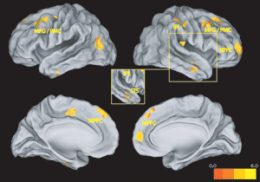Brain Regions Responsible for Empathy Mapped by Researchers

Columbia University researchers have shown for the first time that two brain systems are primarily responsible for allowing humans to accurately predict the emotions of others. Psychology professors Kevin Ochsner and Niall Bolger, graduate student Jamil Zaki and research assistant Jochen Weber used functional MRI scans to zero in on the parts of the brain that people use when correctly discerning how others are feeling.
“Prior work has only shown us what goes on in the brain when you’re reacting to or thinking about another person’s emotions,” said Ochsner. “Until now, we haven’t known whether and how these parts of the brain really make you accurate.”
The study, “The neural bases of empathic accuracy,” is being published this week in the early online edition of the Proceedings of the National Academy of Sciences.
The researchers videotaped 11 volunteers discussing emotional events in their lives, such as the birth of a child or the loss of a parent or grandparent. The volunteers then watched their videotapes and rated, moment-to-moment, how positively or negatively they had felt while talking.
Later, a new group of 16 volunteers, dubbed “perceivers,” watched each video. They rated the emotions experienced by each speaker while lying down in a functional MRI scanner, which measures blood-flow in the brain. Researchers then compared the two sets of ratings to judge the perceivers’ “empathic accuracy.”
The researchers found a correlation between the perceivers’ level of accuracy and their reliance on two kinds of brain systems: regions of the parietal and premotor cortex that help people understand the simple intentions behind simple gestures, and the medial prefrontal cortex, responsible for interpreting the meaning of those gestures and putting them into context.
Interestingly, in cases where perceivers were inaccurate, they engaged a third region: one of those responsible for controlling and responding to one’s own emotions.
“It may be the case that when you’re focusing in on your personal experience while watching someone else, you may be missing the cues that they’re giving off,” said Zaki, adding that that finding would need further investigation.
The paper’s authors now plan to apply their findings to the study of autism and, more broadly, to the understanding of social dysfunction. Their methodology may help researchers predict which autism patients will fare better or worse in social settings and to track patients’ progress through treatment.
“There’s the potential of using this to study social function in everyday life,” said Ochsner. “This paradigm could help us figure out why some people are good at interacting with others and have lots of strong, healthy relationships and why others don’t.”













